Summer 2013: Prose
After the World Ends
Fiction by Kait Heacock
The dust will settle over the newly raptured earth. This earth will not look like the earth you knew in days before. It will be torn apart in too many places to count – ravaged by earthquakes, tornadoes, and hurricanes. It will be split open like a mother giving birth to new life, but there will be no new life, only death, and finally, destruction.
This is how my mother would describe the end to me. All I could picture were the five months after the rapture and before the supposed end, when believers would be up in heaven and I could finally enjoy a little quiet at home.
Dust had been collecting in our home lately. Momma didn’t think it mattered much anymore, but it bothered me, thinking about the little particles of dirt and skin floating through the air, covering bookshelves and windowsills, finding their way into us with every inhalation.
My mother first heard Harold Camping’s message one Saturday afternoon as she flipped through the TV channels. We couldn’t afford cable anymore and nothing good ever came on regular television on Saturdays at three. I passed through the living room on my way to the kitchen and caught a brief glance of him – a decrepit old man who looked like death would take him long before his rapture ever did. He sat, sunken, in a big leather chair and there was a shelf of books behind him. He had a large bible opened on his knees that he glanced at occasionally. I watched as the self-taught bible “scholar” looked out at his audience and said with utmost certainty that he knew when the world would end. I couldn’t help but think how brazen he was, but then I left the room and stopped thinking about him.
“What do you think of this?” Momma had called me from the couch.
“Think about what?”
“The world ending like he says it will.”
“I don’t know. I think maybe Mr. Camping’s a sad man and he wants to believe in something.”
“I guess. For all we know, he could be right.” I don’t know how much she thought about going to heaven; I think Momma thought mostly about this life being over with.
I didn’t want to think about the world ending. At only sixteen, I had just discovered the band Nirvana, started sneaking cigarettes from my mom’s pack, and was still a virgin. The furthest I had gotten was letting a boy feel me up after a dance. My parents didn’t raise me with religion. They taught me to respect my elders and not to swear in front of strangers. We didn’t go to church on Sunday mornings, but we camped at Rimrock Lake and we ate dinner together, and we were just as good as any other family. Last year my dad left, then it was just Momma and me. He promised it wasn’t my fault, just said Momma was so sad all the time and he didn’t know how to make her happy anymore. He didn’t say where he was going, but I guessed it was far away from Ellensburg. He didn’t ask me to come, but if he did, I would have said yes.
After my dad left, all my mother could afford to drink was beer. It was in the last couple of months that she stopped dressing herself. I’d come home from school and find her in an old baggy t-shirt he left behind – from a softball team he once played on or a concert they went to long ago. Before I could start my homework or cook us dinner, I would sit down on the couch and brush her hair. She’d move to the floor and I’d sit behind her, silently combing through the tangles. Some days she would want me there more than others. I’d try to leave and she’d say, “Please, baby, just a little longer. Will you please make me look nice tonight?”
She was beautiful, still, even in her thirties. I think she just forgot it sometimes because she was lonely.
“Sometimes I wish I had your hair,” she had told me. “Always so perfectly straight. You didn’t get stuck with my frizz.”
“I love your hair, Momma. You’ve got curls.”
“You’re too good to me. You’re sweet and a good liar.” This made her laugh. Me too. “If I still looked like you, I’d have boys calling the house for me all the time too. Don’t get me wrong, I had them in my day. I had a lot of them, mind you.”
“I never doubted it. You dated a Marine once, didn’t you?” I asked even though I knew the answer.
“Yes, I did. He took me to the Marine Corps ball and everything. I must have been about eighteen. But nobody was ever as handsome as your daddy, I swear it. Come on, let’s switch. It’s your turn.”
I liked the days when we’d switch places. I liked to feel her fingers in my hair. When I was little she used to put those tiny sponge curlers in my hair. She’d twist and pull and wrap my hair around until I cried. She always promised it would be worth it in the morning. Since she knew I hated it so much, she’d wait for big events like class pictures. Once she promised to stay up with me until I fell asleep, said she’d even put curlers in her hair too.
The day of Harold Camping’s rapture, I came home and found my mother sitting on the couch wearing a white sundress. Her tanned skin looked darker against the white cotton. The past month, Momma stopped paying the utility bills because she said they didn’t matter. I had to beg her to write the check so the power wouldn’t get turned off. Once I even forged her handwriting. She started marking the kitchen calendar with X’s to show the countdown until the rapture. I had asked her how she knew Harold Camping was right, and she had said, “Baby, some things you’ve just got to have faith in.” That wasn’t a good enough answer, but she didn’t seem to care.
Now, she stood up and twirled. “It’s pretty, huh? I haven’t worn this in years,” she said as she tugged at the hemline. “Oh, and look, I brushed my hair out and I found my old red lipstick. Do you think it’s too much?”
“Are you going to a rapture or a dance?”
“Hush. I want to look my best. Baby, tonight at six o’clock, I’m going to be taken from this earth and up into heaven. Me. Can you believe that? I’m just sorry you don’t want to come with me.” She said this part like I had misbehaved, like I had forgotten to clean my room or take out the trash.
“I know, Momma,” I said as I passed her on my way to the kitchen.
“It’s not too late. Maybe if I want it enough, that will get us both in.”
Could you take a guest to the rapture, I wondered. “What do you want for your last meal, Momma?”
“It doesn’t matter much to me. I can heat up some leftovers. Can you fix me a drink? I’m so thirsty.”
“Do you really think you should drink right before the rapture, Momma?”
“I just want one beer to take the edge off. I don’t want to be so anxious when I meet my maker. Your grandpa, my daddy, he used to always have a sip of something before we went to church. We’d go to the seven-thirty Mass – Catholics like to get up real early. I don’t think my mother ever knew about it, but I caught him once slipping a little whiskey into his coffee. He called it his ‘Irish coffee’ and told me someday he’d let me have a sip.”
“Did he ever let you?” I called from the kitchen.
“No, he must of forgotten. ’Course he died when I was just a girl.” Momma lost her dad when she was just thirteen, even earlier than I lost mine. Not that mine can’t come back. He still could.
“Liver disease, right?” I asked as I handed her a beer.
“Yeah, I suppose it was.” She put the bottle to her lips and held it for a moment before she took a slow drink.
We ate our dinner on the couch – warmed up tuna casserole and the evening news. Momma said she needed to pay attention to the news. Soon, she expected special reports to blast across the screen telling us of all the natural disasters that would simultaneously occur throughout the world.
“Oh, Momma, you wouldn’t believe what happened in Biology yesterday.” Our teacher, Mr. Hale, was lecturing about Darwin and evolution. Then Samantha, this Mormon girl from a real strict family, handed him a note from her dad that said she didn’t have to be subjected to teaching that went against the Lord’s word. There was a big fuss and the principal had to come in. We ended up watching a movie from the Discovery Channel about animal survival in the Sahara Desert.
“Hush, baby. Not right now. I have to pay attention.”
The weatherman on the television reported that tomorrow would be mostly cloudy with a chance of rain.
“Any minute now, any minute now,” she chanted as she looked out the front window. She wiped her mouth and dropped her napkin on her plate. She took another drink of beer and I could hear her swishing the liquid around like mouthwash. I cleared the TV trays and walked the dishes to the sink.
“Don’t worry about those dishes,” she called to me. Then to herself she said, “I don’t have to worry about nothing now.”
At six, she ran to the front door like she was expecting a visitor. She flung it open and stood in the doorway, her arms held out at her side. She must have stood there for a good five minutes with her eyes closed. I watched her from the couch and kept the news on mute. Then her arms dropped back to her sides, her eyes opened, and she slammed the door shut. I held my breath.
“Unmute the TV. Flip through the channels. I gotta see if there’s any earthquakes.”
An hour passed and she didn’t move from the couch. I washed the dishes, clipped my nails, waited for her to say something.
“Maybe Mr. Camping was wrong, Momma.”
“Do you think I’m not aware of that? The world’s still spinning, ain’t it?”
“I meant maybe his calculations were just a little off. Maybe he got the wrong day. It could be tomorrow, for all we know.”
“Tomorrow could be the rapture?”
“Yes, Momma, it could be.”
“But what if it doesn’t come tomorrow?”
“Then maybe it will come the day after that. You just sit right here and you keep waiting.”
“I want to light some candles. Bring me the tall white candles we used to put out when your daddy lived here. Remember I used to make him spaghetti and meatballs – those were his favorite – and I’d set the table with a tablecloth and use the nice candles. Do we still have those?”
I searched through kitchen drawers, past old bills, a broken can opener, a letter from my father that came with his last child support check, and half a dozen lighters. I cracked the window and lit a cigarette while I searched.
“Bring me a drink too,” my mother called from the living room. “I think I have a little red wine left. You can have a little too. We may as well use up the good stuff. This is my wedding night. I’m going to be a bride again and Lord Jesus’ll be my groom. Did you hear that, baby?”
I sat on the counter by the window, blowing long, practiced puffs of smoke through the opening. Only two more years until my eighteenth birthday, then I could leave her. I stubbed out my cigarette and pulled down a glass to pour wine for her. It hadn’t been used in a while and when I picked it up it left a circular imprint in the dust on the shelf. I grabbed a second glass, blew the dust off the bottom, and poured it for myself. Then I found two white candles, burnt nearly down to the bottom, but I figured they would do.
“Maybe put on some music too.”
“My choice?” I asked.
“Your choice, baby.”
I set everything down on the coffee table and lit the candles. We each held a glass of wine in one hand and a candle in the other, careful not to spill. My mother set her candle in the holder on the table and motioned for me to do the same. She grabbed my hand and squeezed it. I checked the wrinkles on her hand against mine.
“Oh, come Lord Jesus come,” she whispered.
I stayed up with her all night, keeping the vigil. At some point in the middle of the night, I dropped my head onto her lap and she ran her hands through my hair. I closed my eyes as she twisted long strands around her fingers.
| |

|

|
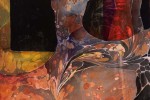 |
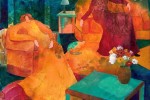 |
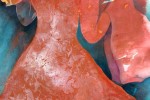 |
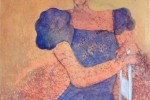 |
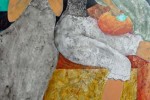 |
||||
|
Rich, strong, poignant, humorous and inspiring. We’ve caught twenty never-before-published poems by sixteen unique voices. |
Seven talented women search for themselves in their bodies, their family, themselves. |
Established dynamos and aspiring voices add colorful visions to our third issue. |
Language leaps off the page in the poetry and prose of five young authors who delight in sensory detail. |
Meet the authors and artists who make this Summer 2013 edition a rich, varied and engaging experience. |

|
LETTER FROM THE EDITORS
POETRY Abandoned Church by Tanya Jarvik Commencement by Kelly Running Depoe Bay by Wendy Thompson Directive by Cristina White Hawk Moth by Wendy Thompson How to Recycle Love Letters by Jennifer Dorner I Swapped a '74 Mustang for This by Jennifer Fulford Polaroid of My Mother by Cindy Stewart-Rinier Lover, Molester, and Maindens (Haibun) by Margaret Chula Savory by Pat Phillips West Seascape by Marjorie Power Suspended by Grace Kuhns The Hand-Off by Pattie Palmer-Baker The Ride by Linda Ferguson The Ticking Shirt by Tricia Knoll Three Facts about Sperm by Ursula Whitcher Three True Stories by Penelope Scambly Schott Today at the Library by Pat Phillips West Trapped Birds by Grace Kuhns You, who will be alive and reading after I'm gone by Penelope Scambly Schott PROSE After the World Ends by Kait Heacock Something Permanent by Ashley-Renée Cribbins Your Hand at Your Throat by Karen Guth Black Sharpie by Anne Gudger Diagnosis by Helen Sinoradzki For He's a Jolly Good Fellow by Laura Stanfill Breathing Underwater by Valerie Wagner ART Unity by Anne John Rearguard by Anne John Speculation by Anne John Wire by Jocelyn White Taitian Trio by Nani Chesire Catch Your Breath by Nani Chesire YOUNG VOICES We Will Read to You by Rebecca Cleveland-Stout Strawberry Party by Natalie Lerner A Young Night by Clara Beaumont Beach Wanderer by Isabella Waldron Light and Dark by Colette Au CONTRIBUTORS |
